

The future is mobile. That is what every single expert seems to agree on, when asked about the future of the web, and online shopping. To ensure a smooth mobile experience, it is necessary to have a powerful mobile browser that you are comfortable with.
But therein lies the problem. There are so many browsers available for iOS that it can become very difficult to know which one is best for your needs. Thankfully you have MakeUseOf to help make up your mind for you.
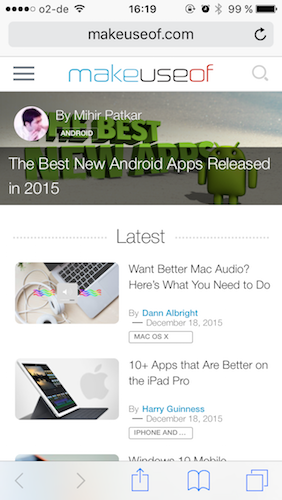
Best for: Apple fans, those who use Safari on OS X too.
Let’s start with the browser that’s baked into every iOS device, whether you like it or not. Safari isn’t a bad browser. In fact in some ways, it is actually quite impressive. The ability to turn websites into easily accessible icons on your iOS desktop can come in pretty handy. You can’t do that with any other browser (to the best of my knowledge), so if you would like a folder full of website shortcuts on your iOS screen, then Safari is your only hope.
What is really annoying is that if you want to open a web page from most third-party apps, the only option is to open it in Safari. Apple seems reluctant to fully open this functionality up to other browsers, but many apps do allow you to stipulate which browser you can use.
You can synchronize your bookmarks across iOS devices and your Mac using iCloud, and this works quite well. However, the one major stumbling block for me was that there is no longer any Safari browser for the Windows desktop. So if you use both Windows and Mac devices, and you want to sync your bookmarks across all of them, then you are out of luck.
Private browsing is supported, and when you search, the top hit can be pre-loaded, so you can get to it quicker.
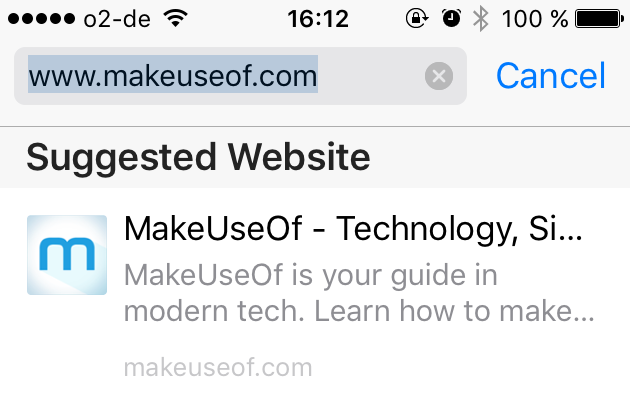
When you are typing in links, Safari often suggests quick one-tap shortcuts to the sites it thinks you are looking for. This makes getting to sites much faster, particularly Wikipedia entries.
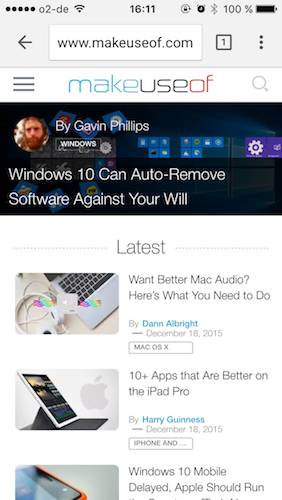
Best for: Google fans, those who use Chrome on their desktop devices and of course Android users.
Due to the Google infrastructure and userbase behind it, Chrome is a very popular free browser for iOS (and just about every other platform too). Browsing is fast, and bookmarks and history can be automatically saved to your Google account. You can sign into multiple Google accounts, switch between them at will, and sync data for each one. It’s as simple as a couple of taps, and it’s something Safari doesn’t even offer on desktop machines.
Chrome also offers a “Data Saver” mode, which is useful for anyone whose data plan is capped, or those of you using pre-paid plans that don’t want to pay eye-watering per-megabyte fees.
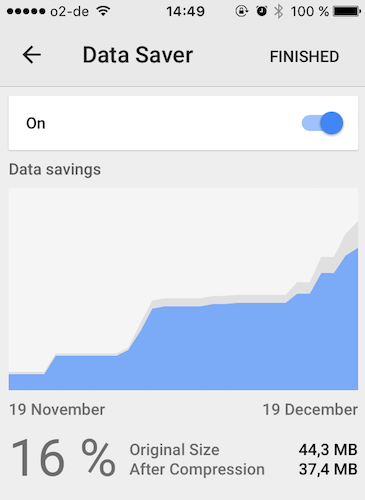
Chrome can also connect to other Google apps. So if you want to view a YouTube video, it will offer to direct you to the YouTube app instead of the YouTube mobile page, Gmail to the Gmail app, and so on. Obviously you would have to have these free apps installed for this to work. A quick visit to the App Store will sort that out.
One disappointing thing though about iOS Chrome is that it doesn’t support DuckDuckGo as a search engine option, but what did you expect from Google?
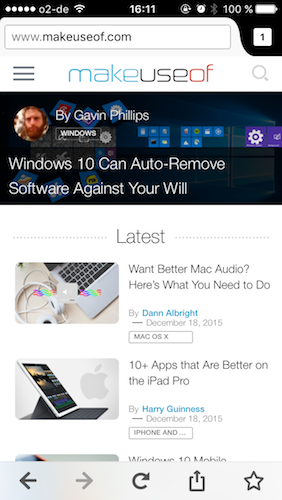
Best for: Die-hard Mozilla fans and anyone who desires more robust search options.
Firefox is a fairly new browser to iOS, and the Mozilla brand will probably tempt many people into downloading and trying it out. After a long time coming, =was it worth the wait? It’s difficult to say right now, as it seems to have some performance issues (at least for me). Loading of webpages is a bit sluggish, and the syncing of bookmarks could be a bit faster.
Although Google is the default search engine, Firefox for iOS does imitate its desktop siblings in that it also offers “quick-search engines”. These can range from Amazon to DuckDuckGo to Wikipedia — there’s a wider selection of search engines than either Safari or Chrome.
Pop-up haters will like the blocker, and privacy enthusiasts will like how private tabs can be automatically closed when you exit the browser (neither Chrome or Safari offer this).
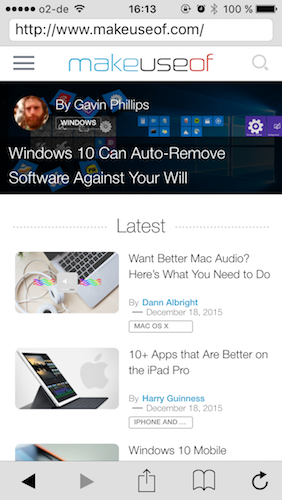
Best for: Those concerned with privacy, and users who want to use Tor from their mobile devices.
No, this is not a product of the satire news site, but a Tor-enabled browser with an emphasis on privacy (although 100% anonymity cannot be guaranteed). Everything you look at is encrypted and sent via the Tor network. This means websites will not see your I.P. address, and Internet service providers will not be able to see what you are visiting. Say adios to some filters and censors (it won’t eliminate ALL filters), and choose to block cookies and scripts if you want. Finally you can visit the Dark Web as well, for whatever reason you may want to.
Everything that you have looked at, all session data, can be automatically wiped when you exit the browser. Simply press “New Identity” before closing everything.
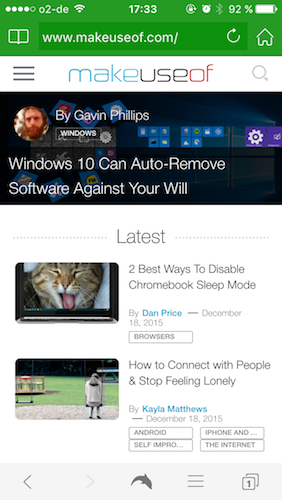
Best for: Browsing using touch-based gestures.
I switch between Dolphin and Chrome often, mainly because I love both browsers. What I love about this one is the ability to use gestures to open sites. Sometimes I am just too lazy to type a URL in, and when I do, my laziness makes me misspell it over and over. For those “can’t be bothered” moments, I use Dolphin and its pre-configured gestures.
So as you can see below, for me, M is for MakeUseOf. G is Google, GN is Google News, Y is Yahoo (yes, Yahoo still has at least one confirmed visitor). When you have two letters, you have to join them together as one, and not take your finger off the screen when you are “drawing” it. Once your finger comes off, Dolphin assumes you’re finished and finds the page.

Other features include tab sharing, sharing to third party sites, third party add-ons, and tab syncing. All in all, a most magnificent browser.
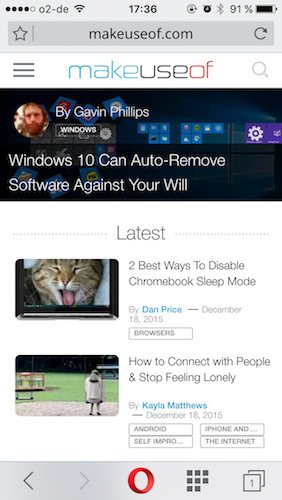
Best for: Those on tight data allocations or slow connections who want to use the least bandwidth possible.
Opera Mini is another one that I have been getting to know recently. It has some really neat features, including quite speedy page loading. Like Chrome, Opera Mini has a data saver function, which will save you bandwidth, as well as speeding things up by compressing web content to better suit your device. One example of this is the ability to specify image quality, with lower quality images costing you less bandwidth.

Other features include a choice of themes (I was using a snazzy yellow interactive Christmas theme over the holidays), night mode (to protect those eyes of yours), a speed-dial page for most-visited sites, pop-up and cookie blocker, and full-screen mode. The Force is strong with this one.
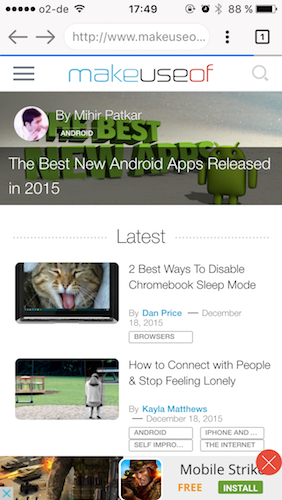
Best for: The privacy-conscious and paranoid.
We have profiled Ghostery before on MUO, but that was for desktop computers. Did you know they also have an iPhone app? It applies the same principles as the desktop version by blocking all the nasty critters which track you across the web. When it develops a list of all the trackers that are chomping at the bit to come after you, you can enable/disable them with a swipe of the finger.
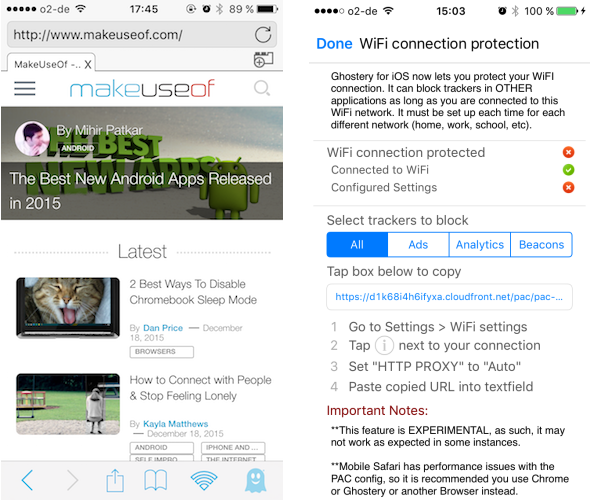
You can also use Ghostery to protect your browsing iOS-wide. As the screenshot above shows, you have to set this up by modifying your Wi-Fi settings. Another one for my “Browsers” folder on my iPhone!

Best for: Those “buying a present for the wife” people.
This is another browser which encrypts and sends all of your web traffic through the Tor network. With 2,000+ near perfect reviews on the App Store, this seems to me to be better than the Onion browser if you want a Tor experience on iOS. For a start, it feels faster, and a lot smoother.
By pressing “New Identity”, you can be bounced from place to place. One minute I was in Romania. The next I was in Russia (all the touristy spots then). Tapping it a third time took me to Boston, USA.

As with the Onion browser, you can configure it so your session is wiped when you shut the browser down. This browser and the Onion browser are both two excellent options for anyone living under an oppressive regime which attempts to limit and track Internet traffic.
You would be seriously deluded if you thought those were the only options available for iOS. In fact, the hits just keep on coming. Unfortunately, I don’t have the time or space to include them all thoroughly, so here are a few you might want to check out if the above don’t cut it for you:
After looking at that list, which ones are going to make it onto your device? What makes those better than all the others? Let’s discuss in the comments section below!




 The Secret World Beginner’s Guide
The Secret World Beginner’s Guide Fallout 4 Mission Guide: Cleansing the Common...
Fallout 4 Mission Guide: Cleansing the Common... Top 10 Players in FIFA 15
Top 10 Players in FIFA 15 Destiny: The Taken King Guide On Things To Do After Reaching Level 40: Light Levels, Questing & More
Destiny: The Taken King Guide On Things To Do After Reaching Level 40: Light Levels, Questing & More How To Upgrade To Windows 10 For Free From Windows 7 and Windows 8/8.1
How To Upgrade To Windows 10 For Free From Windows 7 and Windows 8/8.1